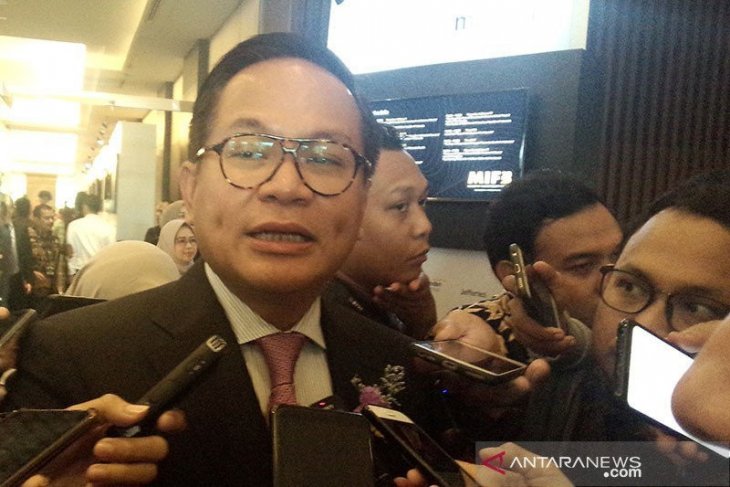Live Streaming
Program Highlight
Company Profile
Status Upgrade Opportunity to Emerge From Middle-Income Trap: Jokowi
Written by Nouvarah Ahdiba
President Joko Widodo (Jokowi) believes Indonesia's financial status upgrade to "upper middle income country," from "lower middle income," according to the World Bank’s announcement should be an opportunity to emerge from "the middle income trap".
"This status upgrade is one aspect that we should grateful for and treat as an opportunity for moving forward, taking an advanced leap as we strive to become a 'high income country' as well as getting out from the 'middle income trap',' Jokowi emphasized.
The World Bank's announcement on July 1 cited that Indonesia’s gross national income per capita had increased to US$4,050, from $3,840.
This status upgrade is also a notable starting point for Indonesia to later become a developed nation, Adi Budiarso, an official of the finance ministry, remarked at another occasion, adding that the country essentially looks forward to what to fight for in order to be in that position.
Budiarso perceives that the challenge ahead of huge concern is boosting Indonesia's competitiveness, as it is ranked 50th worldwide, falling from 45th last year, according to the Global Competitiveness Index (GCI). (ANTARA)
July
Religious Affairs Takes Hajj Registration to Digital Platform
Written by Ani Hasanah
The Indonesian Ministry of Religious Affairs Hajj services directorate announced on its official website on Thursday that it is preparing to launch an online Hajj registration system.
“We prepared two innovations to ease Indonesian hajj pilgrims in registering for the hajj pilgrimage, both online and mobile,” said the ministry’s domestic hajj services director, Muhajirin Yanis in the website on Thursday.
Prior to introducing this ‘innovation’ in public services, the ministry only served five hajj pilgrims per day due to the manual registration system added by the current pandemic condition even though the ministry had already imposed an online payment system since two years ago.
The Religious Affairs Ministry introduced the registration process that is overseen by Law No.8/2019 which utilizes the mobile services that will be spread across a number of locations according to each Religious Affairs branch offices.
“The registration process can be done anywhere. It is already digital-based,” said Muhajirin. (tempo.co)
July
Perbanas: Domestic Banking Industry Remains Robust
Written by Ani Hasanah
National Bank Association (Perbanas) chairman Kartika Wirjoatmodjo. (ANTARA/Citro Atmoko)
The domestic banking industry has fared relatively well and has remained strong in the midst of the pandemic, as reflected by several indicators, according to the National Bank Association (Perbanas).
The capital adequacy ratio (CAR) of banks as of April this year stood at 22.03 percent, and the ratio of non-performing loans (NPL) remained low at 2.89 percent (gross) and 1.13 percent (net), Perbanas chairman Kartika Wirjoatmodjo said in a statement received on Wednesday in Jakarta.
“The CAR in April, 2020 was indeed lower than (at) the end of 2019, but a CAR of 22 percent shows (the banking industry is in) good condition," Wirjoatmodjo said.
Meanwhile, the ratio of liquid/non-core deposit (AL / NCD) and liquid / DPK (AL / DPK) tools as of April was pegged at 117.8 percent and 25.14 percent, far above the respective thresholds by 50 percent and 10 percent, he said.
Wirjoatmodjo said that to tide over the current challenging situation, the banking industry requires strong capital.
Therefore, banks have been striving to maintain capital adequacy above a predetermined threshold.
This is certainly a common concern for maintaining financial system stability, he said. Therefore, he added, Perbanas appreciates the efforts made by the Financial Services Authority (OJK) to strengthen the national banking industry by encouraging large investors, who are able to ensure the sustainability of banking in Indonesia.
According to Wirjoatmodjo, the banking industry is facing a challenging situation, in terms of liquidity issues, sluggish credit demand, the ability of debtors to repay loans, and the issue of sustaining profitability in face of margin pressures.
However, Perbanas sees the regulator and the government have tried to overcome these problems by offering a series of relaxations and formulating a number of necessary policies, he noted.
As an association of industry players, continued Wirjoatmodjo, Perbanas has also been quite involved in providing input.
He said he feels the tradition needs to be maintained because, to face difficult situations, intense communication and strong coordination between all stakeholders is needed. (ANTARA)
Sugar Production Projected to Reach 540,000 Tons in June-August
Written by Ani HasanahSugar production in Indonesia has entered its peak season and is expected to reach 540 thousand tons in June-August, according to the Agriculture Ministry.
The ministry's director general of plantations, Kasdi Subagyono, said sugar production is expected to reach 430 thousand to 530 thousand tons in June-July, and increase to 540 thousand tons by August.
"In August, it will increase to 540 thousand tons and start to decline from September onwards. This will cover our sugar demand," Subagyono said during a hearing with Commission IV of the House of Representatives, which is overseeing agriculture, plantations, forestry, maritime, fisheries, and food affairs, in Jakarta, on Wednesday.
According to Subagyono, limited domestic sugar production during March and May had prompted the commodity's price hike.
As sugar production has entered its peak season, he said, sugar price is expected to drop.
In May-June, the ministry recorded a downward trend in sugar price, although it still exceeded the ceiling price of Rp12,500 per kg.
Between May 4 and June 26, 2020, prices declined by 15.8 percent, from Rp18,000 to Rp15,000 per kg, Subagyono said.
The increase in sugar price was also affected by uneven distribution due to the imposition of large-scale social distancing (PSBB) in some regions to curb COVID-19 transmission.
However, the Agriculture Ministry, through its Food Security Agency, has continued to conduct market operations to stabilize the sugar price. (ANTARA)




